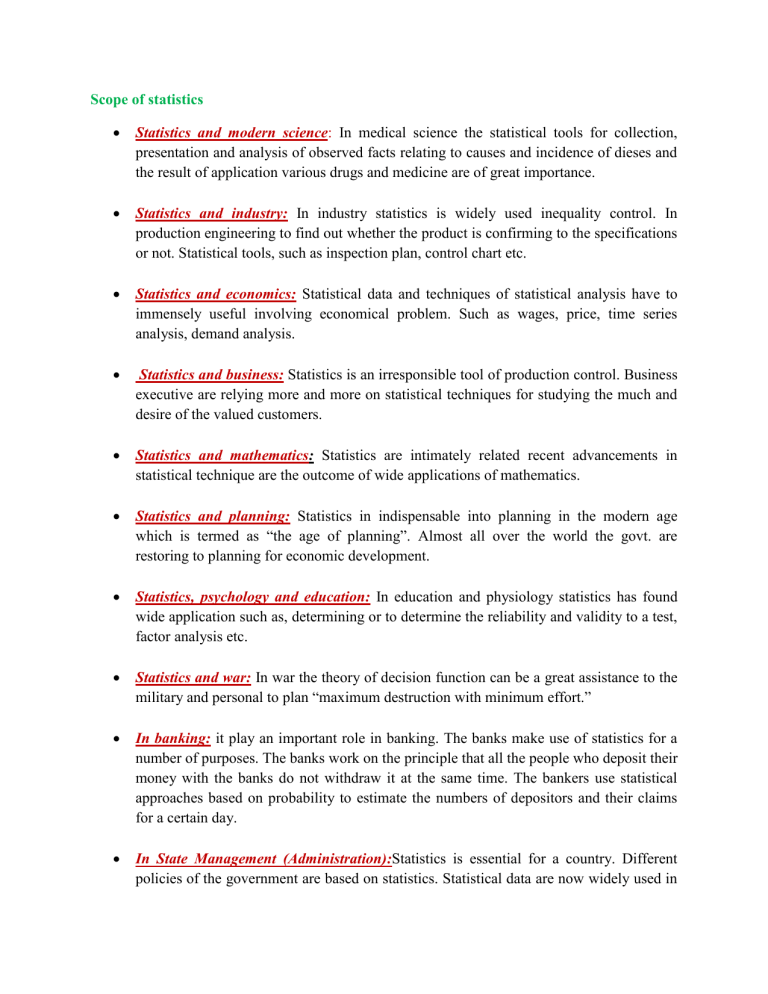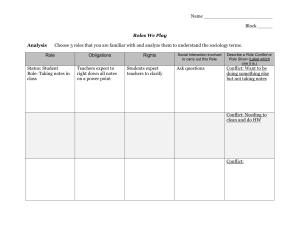Scope of Statistics: Applications in Various Fields
advertisement

Scope of statistics Statistics and modern science: In medical science the statistical tools for collection, presentation and analysis of observed facts relating to causes and incidence of dieses and the result of application various drugs and medicine are of great importance. Statistics and industry: In industry statistics is widely used inequality control. In production engineering to find out whether the product is confirming to the specifications or not. Statistical tools, such as inspection plan, control chart etc. Statistics and economics: Statistical data and techniques of statistical analysis have to immensely useful involving economical problem. Such as wages, price, time series analysis, demand analysis. Statistics and business: Statistics is an irresponsible tool of production control. Business executive are relying more and more on statistical techniques for studying the much and desire of the valued customers. Statistics and mathematics: Statistics are intimately related recent advancements in statistical technique are the outcome of wide applications of mathematics. Statistics and planning: Statistics in indispensable into planning in the modern age which is termed as “the age of planning”. Almost all over the world the govt. are restoring to planning for economic development. Statistics, psychology and education: In education and physiology statistics has found wide application such as, determining or to determine the reliability and validity to a test, factor analysis etc. Statistics and war: In war the theory of decision function can be a great assistance to the military and personal to plan “maximum destruction with minimum effort.” In banking: it play an important role in banking. The banks make use of statistics for a number of purposes. The banks work on the principle that all the people who deposit their money with the banks do not withdraw it at the same time. The bankers use statistical approaches based on probability to estimate the numbers of depositors and their claims for a certain day. In State Management (Administration):Statistics is essential for a country. Different policies of the government are based on statistics. Statistical data are now widely used in taking all administrative decisions. it helps in estimating the expected expenditures and revenue from different sources. So statistics are the eyes of administration of the state. In Accounting and Auditing: accounting is impossible without exactness. The correction of the values of current asserts is made on the basis of the purchasing power of money or the current value of it. In auditing sampling techniques are commonly used. An auditor determines the sample size of the book to be audited on the basis of error. In Natural and Social Sciences: it plays a vital role in almost all the natural and social sciences. Statistical methods are commonly used for analyzing the experiments results, testing their significance in Biology, Physics, Chemistry, Mathematics, Meteorology, Research chambers of commerce, Sociology, Business, Public Administration, Communication and Information Technology etc. In Astronomy: Astronomy is one of the oldest branches of statistical study; it deals with the measurement of distance, sizes, masses and densities of heavenly bodies by means of observations. During these measurements errors are unavoidable so most probable measurements are founded by using statistical methods. Statistics and Sociology: Sociology is one of the social sciences aiming to discover the basic structure of human society, to identify the main forces that hold groups together It highlights and illuminates aspects of social life that otherwise might be only obscurely recognized and understood. The sociologist may be called upon for help with a special problem such as social conflict, urban plight or the war on poverty or crimes. Statistics and Government: The functions of a government are more varied and complex. Various depts. in the state are required to collect and record statistical data in a systematic manner for an effective administration. Data pertaining to various fields namely population, natural resources, production both agricultural and industrial, finance, trade, exports and imports etc are the most fundamental requirements of the state for its administration


